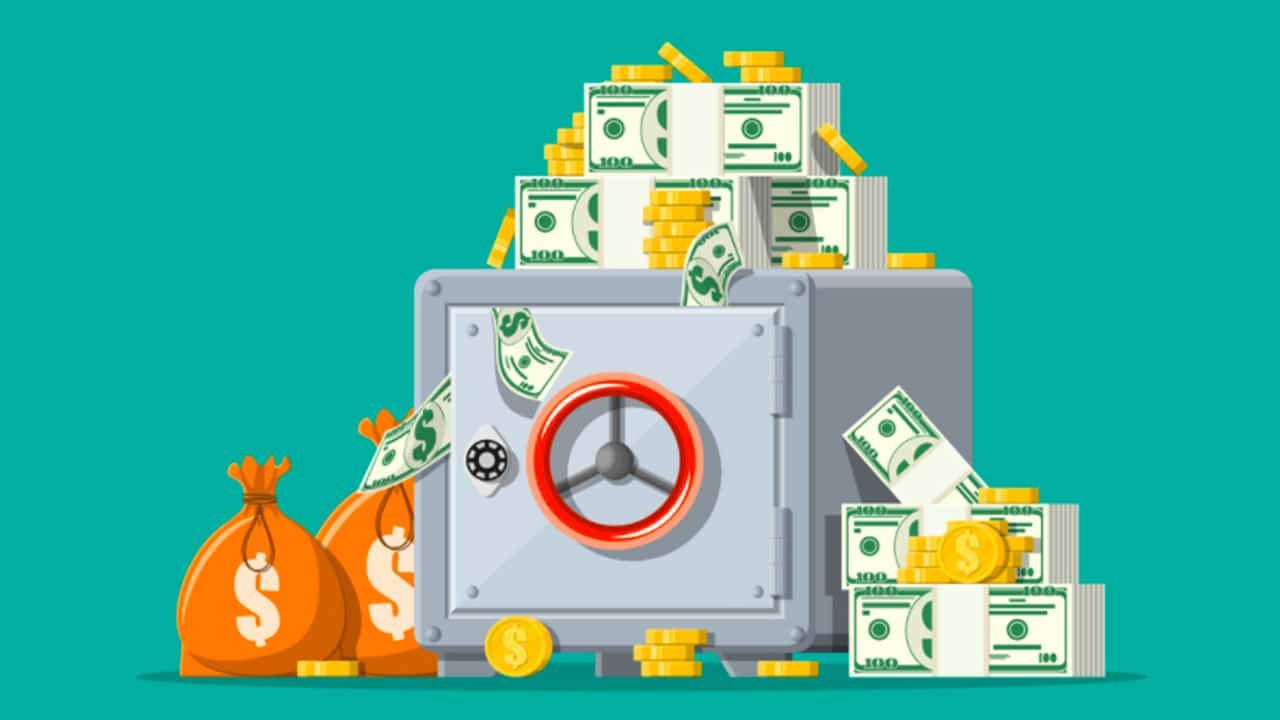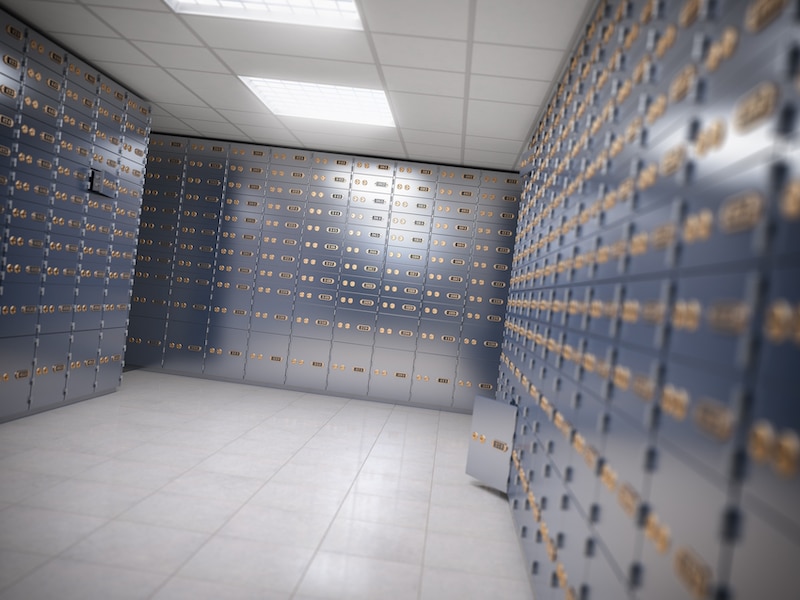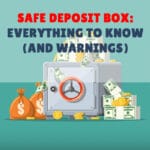
Source: The College Investor
Have you been considering getting a safe deposit box, but just don't know where to find one?
Do you have important valuables and documents lying around the house? A robbery or fire could be especially devastating if your most important documents are all stored in your home. That’s why a safe deposit box can come in handy.
Let’s explore what a safe deposit box is and when it makes sense to use one. We'll also warn you about a few potential downsides that you may not have considered.
How Does A Safe Deposit Box Work?
A safe deposit box offers a way to keep your valuables in a secure location outside of your home. When you visit your safety deposit box in person, it will look like a long, rectangular metal box that is stored in your financial institution.
The box will have two keyholes, which will need to have both keys inserted simultaneously to open the box. One of the keys is held by your bank or credit union. You, and only you, will hold the second key.
Note that while you won't have to worry about keeping track of your valuables after renting a box, you will need to keep track of your key. If you lose it, your bank will most likely need to call a special locksmith to open it. And you can expect to be charged a fee for their troubles.
The double key system allows for an extremely secure location to store precious items. It would be next to impossible for anyone to steal the items within a safe deposit box. Even if a thief stole your key, the bank will require information to verify your identity before opening the box.

Safe deposit boxes room inside of a bank vault. Source: Depositphotos
What Can You Store In a Safe Deposit Box?
Some things you might consider storing in a safe deposit box include:
- Rare Coins
- Jewelry
- Stock Certificates
- Irreplaceable documents (including old family photos)
- Insurance policies (but not your proof of insurance card)
- Savings bonds
- Property deeds
- Birth certificates
Of course, not everything belongs in your box. A few items that would do better in a different location include cash, an original copy of your will, letters of instruction for your estate post mortem, an advanced health care directive, or any items that are deemed illegal by your state.
Benefits Of A Safe Deposit Box
Here are the two main advantages that safe deposit boxes offer.
High Level Of Security
The biggest benefit of a safe deposit box is that it is secure. It is probably one of the securest places an individual of the public can store something. After all, a bank offers multiple layers of security that most homeowners don’t.
A few of these heightened security measures include alarms, guards, cameras, vaults, and motion detectors.
Beyond that, it's also not in your house. By being in a secondary location, it minimizes some risks, like fire.
Relative Affordability
On average, you can expect to pay around $60 per year to use a safe deposit box. However, the size of the box will dramatically impact the cost. A larger box will lead to a higher annual bill.
Additionally, different banks have slightly different prices. For example, Bank of America offers a 3” by 5” box for $75 per year. But Chase Bank offers the same size box for $50 per year.
Warnings About Safe Deposit Boxes
Despite the advantages listed above, safe deposit boxes can also create more hassle and headaches in certain situations. As you consider whether it makes sense to rent one, keep these warnings in mind.
Access During Banker Hours Only
One of the biggest cons of a safe deposit box is the hassle of going to the box to get whatever I need. The nice part is that whatever I store there will be needed very rarely. I would also have to go during bank hours, which could be hard if I was working.
Additionally, it is important to consider what could happen if the bank closed for an extended period of time. For example, during the COVID-19 crisis, many banks closed their doors to the public for weeks. With that, many couldn’t access their valuables for an extended period of time.
Recurring Cost
A second concern is the annual cost. Although the cost may seem relatively low, it is yet another expense to add to your annual budget. An alternative is to buy a fire-proof safe for your home. However, these can easily cost hundreds of dollars.
Possible Loss
Although the security measures within a bank are very high, that doesn’t guarantee against possible losses. In fact, a recent New York Times investigative piece found that a few hundred customers of safe deposit boxes report missing items each year.
If an item does go missing from your box, most banks aren't required to cover the loss. Of course, you can have your own insurance policy on the items. But that is another cost to consider.
Complications If Owner Dies
As we mentioned above, the bank is only able to open a safe deposit box to the owner of the box. With that, it's important to think through what happens to the box when the owner dies.
It's possible to make someone else a co-renter of the box. For example, many spouses will add their partner as a co-renter. But without a co-renter in place, things become more complicated. Essentially, anyone seeking access to the box after the owner’s death would need the backing of a court order.
This is a key point because certain important papers, such as a will, could be difficult and expensive to gain access to due to the involvement of judges and lawyers
Limited Availability
Not all banks offer safe deposit boxes. As people have embraced digital storage, the need for them has declined and so has the number of banks offering the service.
Related: Kubera is a digital net worth tracker that also has an online safe deposit box for important documents and a heartbeat monitor to send things to a beneficiary if needed.
What Banks Currently Offer Safe Deposit Boxes?
There are a lot of local banks that offer safe deposit boxes, but it's getting rarer and rarer every year. Many banks are consolidating them or eliminating them altogether.
A few banks that still offer safe deposit boxes include Bank of America, Chase, Wells Fargo, U.S. Bank, Truist, Regions, and PNC Bank. Local financial institutions may also offer them.
Bank of America
Bank of America offers safe deposit boxes with the following details:
- Pricing ranges from $60 to $125 per month for the most sizes
- Preferred Rewards members (Platinum or Platinum Honors tier) can rent a small safe deposit box for free
- 15% annual discount (up to $70) for customers who set up automatic payments from a Bank of America account
Chase
Chase provides safe deposit boxes with these terms:
- Pricing varies by state, but seem to range from $55 to $165 per month
- Premier Plus Checking account holders get a free small-sized box (subject to availability) and a 20% discount on larger options
PNC Bank
PNC Bank provides safe deposit boxes with the following prices:
- Prices range from $49 to $146 per month for the most sizes
- Customers with Performance Select checking accounts get a $100 annual discount
- $5 per month discount for automatic payments
TD Bank
TD Bank provides safe deposit boxes with the following prices:
- Prices range from $70 to $360 per month
U.S. Bank
U.S. Bank provides safe deposit boxes with the following prices:
- Prices range from $50 to $300 per month
- 50% discount for current or former military members and customers aged 65 and older
- 50% discount for customers with Platinum Checking accounts
Wells Fargo
Wells Fargo offers safe deposit boxes at many of their locations, but prices vary by branch.
Final Thoughts
A safe deposit box can be a useful way to store your valuables, but it's not a hassle-free option and it does come with a recurring cost.
A safe deposit box might still be your best option for storing physical items like jewelry, coins, and other collectibles. But if you're only looking to store paper documents, you might want to look for digital storage alternatives instead.

Robert Farrington is America’s Millennial Money Expert® and America’s Student Loan Debt Expert™, and the founder of The College Investor, a personal finance site dedicated to helping millennials escape student loan debt to start investing and building wealth for the future. You can learn more about him on the About Page or on his personal site RobertFarrington.com.
He regularly writes about investing, student loan debt, and general personal finance topics geared toward anyone wanting to earn more, get out of debt, and start building wealth for the future.
He has been quoted in major publications, including the New York Times, Wall Street Journal, Washington Post, ABC, NBC, Today, and more. He is also a regular contributor to Forbes.
Editor: Clint Proctor Reviewed by: Claire Tak
